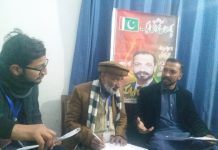WASHINGTON, Sep 16 (TNS) The C.I.A. is pushing for expanded powers to carry out covert drone strikes in Afghanistan and other active war zones, a proposal that the White House appears to favor despite the misgivings of some at the Pentagon, according to current and former intelligence and military officials.
If approved by President Trump, it would mark the first time the C.I.A. has had such powers in Afghanistan, expanding beyond its existing authority to carry out covert strikes against Al Qaeda and other terrorist targets across the border in Pakistan, The New York Times reported Saturday.
The changes are being weighed as part of a broader push inside the Trump White House to loosen Obama-era restraints on how the C.I.A. and the military fight Islamist militants around the world. Trump administration would open the way for broader C.I.A. strikes in such countries as Libya, Somalia and Yemen, where the United States is fighting the Islamic State, Al Qaeda or both.
Until now, the Pentagon has had the lead role for conducting airstrikes — with drones or other aircraft — against militants in Afghanistan and other conflict zones, such as Somalia and Libya and, to some extent, Yemen. The military publicly acknowledges its strikes, unlike the C.I.A., which for roughly a decade has carried out its own campaign of covert drone strikes in Pakistan that were not acknowledged by either country, a condition that Pakistan’s government has long insisted on.
CIA chief said that the agency was hunting “every day” for Al Qaeda’s leaders, most of whom are believed to be sheltering in the remote mountains that straddle the border between Afghanistan and Pakistan. “If I were them, I’d count my days,” Mr. Pompeo said.
One senior Defense Department official said that the United States would gain little from having the C.I.A. carry out drone strikes alongside the military, and that it raised the question of whether it was an appropriate use of covert action.
Mr. Pompeo’s argument seems to be carrying the day with Mr. Trump, who has struck a bellicose tone in seeking to confront extremist groups in Afghanistan, including Al Qaeda, the Islamic State and the Haqqani network, a faction of the Taliban
Among the chief targets for the C.I.A. in Afghanistan would be the Haqqani network, whose leader is now the No. 2 in the Taliban and runs its military operations. The Haqqanis have been responsible for many of the deadliest attacks on Afghanistan’s capital, Kabul, in the war and are known for running a virtual factory in Pakistan that has steadily supplied suicide bombers since 2005.
“We broke the back of Al Qaeda,” he said at a public appearance in July, referring to the drone campaign inside Pakistan that decimated the militant network’s leadership ranks. “We took down their entire network,” he said. “And that’s what we’re going to do again.”













